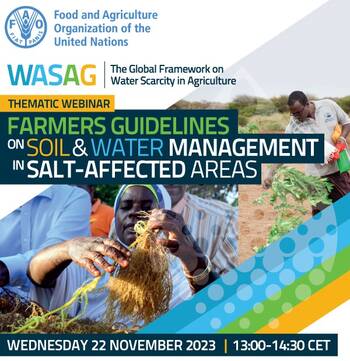Farmers' Guidelines on Soil and Water Management in Salt-affected Areas
Date: Wednesday, November 22, 2023, 13:00-14:30 CET
Background
The threats posed by salt-affected soils to global food security are increasing with climate change. According to the recent global salt-affected soils map, over 424 million hectares of topsoil (0–30 cm) and 833 million hectares of subsoil (30-100 cm) are currently salt-affected. The Saline Agriculture Working Group of the Global Framework on Water Scarcity in Agriculture (WASAG) developed practical guidelines for farmers implementing agriculture in salt-affected areas to assist them in their decision-making processes in dealing with salinity and sodicity issues in their lands. The guidelines are split into two thematic volumes. The thematic 1 focuses on "Soil and water management in salt-affected areas" and thematic 2 on "Saline farming schemes and crops suitable for salt-affected areas".
The webinar launched the thematic 1 of the farmers' guidelines and showcased the relevance and importance of the proper soil and water management practices to be implemented within the saline agriculture context. Eminent international experts shared their experiences on water and soil management from various geographical regions affected by salinity or sodicity. The working group along with invited experts on saline agriculture also discussed how the guidelines could be better implemented, empowering farmers to get more effectively involved in saline agriculture practices. The webinar contributed to the preparations of the technical session that will be held at the WASAG Plenary Assembly on 29–30 April 2024, where the opportunities offered by saline agriculture to several Member Nations will be showcased, along with the Saline Agriculture Working Group outputs and future prospects.
Objective
i. Illustrate the relevance and importance of saline agriculture and the farmer's guidelines development, in the context of climate change and increasing salinity issues on global level; due to time limitations the Webinar will focus on three case studies (MENA, Central Asia and Southeast Asia);
ii. Demonstrate the importance of developing effective training modules for farmers and brainstorm with eminent professionals on saline agriculture about how to implement the guidelines more effectively and empower the farmers to make the proper decision making for the salinity issues they are facing;
iii. Solicit country support and involvement;
iv. Receive valuable inputs that could be inserted in the technical session on saline agriculture of the WASAG Plenary Assembly of 29th-30th April 2024;
Watch the recording of the webinar here:
Agenda
Moderators: Jean Boroto, Senior Officer, FAO
Dionysia Angeliki Lyra, Halophyte Agronomist, ICBA
- Opening remarks – Luis-Augusto Becerra, Chief Scientist, ICBA
- Current status and Vision Unfolding for Farmers’ Guidelines (FGs) – Dionysia Angeliki Lyra, ICBA, Saline Agriculture Working Group Lead
- Launch of the Thematic 1: “FGs on Soil and Water management in salt-affected areas” – Fatma Rekik, World Bank
- “FGs on Soil and Water management in salt-affected areas” customized for three case studies – WASAG saline agriculture working group:
- MENA region – Francisco Pedrero Salcedo, CEBAS-CSIC
Pedro Garcia Caparros, University of Almeria - Central Asia – Sharon E. Benes, California State University, Fresno
- Southeast Asia – Andres Parra Gonzalez, The Salt Doctors
- MENA region – Francisco Pedrero Salcedo, CEBAS-CSIC
- Salinity management in China – Invited speaker: Shuwen Hu, Professor, China Agricultural University, China
- Discussion – Invited experts sharing their experience on salinity management from their regions and providing feedback on FGs:
- Ed Barrett-Lennard, Professorial Fellow, Murdoch University, Australia
- Vinay Nangia, Research Team Leader, Soils, Waters and Agronomy, ICARDA, Morocco
- Abdelaziz Hirich, African Sustainable Agriculture Research Institute (ASARI), Mohammed VI Polytechnic University (UM6P), Morocco
- Judit Snethlage, Wageningen University & Research (WUR), The Netherlands
- Maria Konyushkova, Global Soil Partnership, Land and Water Division, FAO
- Robert Caudwell, IRRI Vietnam Office
- Q&A
- Closing remarks: Marco Arcieri, President, ICID

